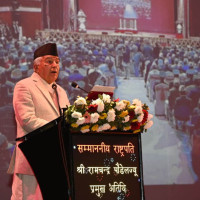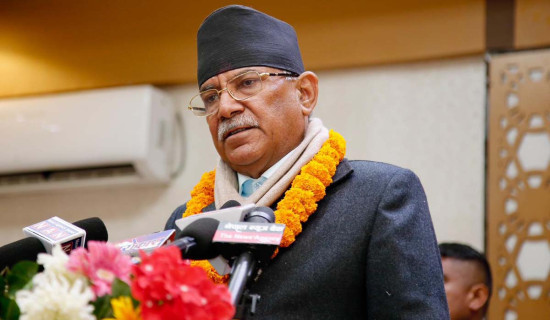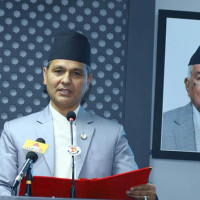- Saturday, 24 January 2026
Carter Set Stage For Peace Negotiation
Former US President Jimmy Carter’s passing away at the age of 100 recently has prompted jurists, attorneys, conflict resolution scholar and practitioners to reflect on his contributions to the field of negotiation and mediation. His skills and dexterity to enrich the mediation and negotiation have left an indelible mark on the world stage. Carter held a unique place in US politics. But his one term in office as president of the US was tarnished by his inability to end the 1979 Iran hostage crisis, among others. He was perceived as naive and weak head of the state in the Machiavellian world of global politics.
But as the years passed, a new positive image of Carter emerged, one that took in his post- presidential activities and reassessed his achievements, like the brokering of a peace deal between Israel and Egypt. Carter was elected US president to head a country at a time when a strong leader was needed to dispel the gloom left over from the Vietnam War, the Watergate scandal and a deep recession. For the first time since 1968, the Democrats controlled the White House and Congress, so hopes were high as Carter took office. A shining moment of his term in office was the historic 1978 Camp David Accords signed by Israel's Menachem Begin and Egypt's Anwar Sadat, which ultimately led to a peace treaty the following year.
Rapprochement
Carter also established diplomatic relations with China following the rapprochement initiated by then-president Richard Nixon. But his administration hit numerous snags, the most serious being the Iran hostage crisis and the disastrous failed attempt to rescue the 52 captive US citizens in 1980. But Carter bounced back in perhaps the most spectacular reinvention of any US leader and was often called the United States best ex-president.
Carter founded centre in his name called Carter Center and emerged as a prominent international mediator, tackling some of the most intransigent global dilemmas – including North Korea and Bosnia in the 1990s. He monitored dozens of elections around the world, from Haiti to East Timor, and went to Cuba in 2002 for a historic meeting with then longtime Communist leader Fidel Castro to prod him on human rights. It is therefore that the legal professionals who focus on amicable means of conflict negotiation find much to admire and emulate in Carter’s approach. Attorney Thomas H. Prol, a member of the American Bar Association in his write up published in mediate.com shares poignant memories of his internship with the Carter Center. Prol calls it a transformative experience early in his career. "I spent three months researching Somalia’s Civil War in 1990,” Prol said, describing his meeting with Carter during a briefing session on the East African country’s deadly conflict while immersed in the former president’s Conflict Resolution Centre activities. Carter told me he was even pen pals with Mohamed Siad Barre, the dictator in power, Prol writes. Carter emphasised that peace requires setting aside moral judgments.
In my briefing with him, I talked about all the horrible things that Siad Barre was doing, the murders, the atrocities and all that, Prol shares. Carter stopped me, and said, ‘If you were to walk into a room and try to make peace with Siad Barre, you’ve already assigned a moral judgment based on your morality, your values. You’ve assigned that to him, and you will never get the success with that because you’ve already pre-judged him. You have to walk in with a blank slate if you’ve got to get to the goal of peace.’ That’s my experience with Carter’s approach to negotiation.
At that time, there were 117 civil wars going on around the world, and Carter tried to do as much as he could to get involved in that. For Carter, it was the number of people who are dying unnecessarily. His goal or vision for peace was to end that bloodshed. He tried to step into as many of those 117 conflicts as he could. Carter’s ability to engage warring factions in constructive conversations set a standard for mediators worldwide. Like attorney, Prol, Former U.S. District Judge Jose L. Linares of the District of New Jersey highlights the relevance of Carter’s mediation style to today’s legal practitioners.
Those of us who work in the alternative dispute resolution field and those seeking innovative and sensible ways to resolve conflicts without escalating through the litigation process would benefit from studying President Carter’s legacy of mediation and his use of alternative ways of resolving and reaching amicable resolutions to complex, often dangerous and seemingly intractable situations,” Linares shares . Linares points to Carter’s ability to identify common ground among adversaries as a hallmark of his success.
Common ground
President Carter’s genius was in finding common ground among adversaries on the world stage and helping them reach productive solutions. Carter’s approach to negotiation —setting aside moral judgments and focusing on peace as the ultimate goal—has resonated deeply within the legal community. His methods serve as a model for professionals seeking to mediate disputes in a manner that prioritises understanding and resolution over confrontation.
Carter’s legacy as both Prol and Linares underscored is one of unyielding dedication to peace and the betterment of society through dialogue and understanding. They agree that Carter’s work offers valuable lessons for attorneys, mediators and negotiators who aim to resolve disputes effectively while upholding principles of fairness and empathy. As the legal world reflects on Carter’s life, his principles—kindness, decency and compassion—remain as relevant as ever. In a world increasingly divided by conflicts, Carter’s lessons on negotiation and mediation remain a beacon of hope and a reminder of what is possible when negotiators approach disputes with empathy, innovation and an unwavering commitment to resolution.
(The author is presently associated with Policy Research Institute (PRI) as a senior research fellow. rijalmukti@gmail.com)















